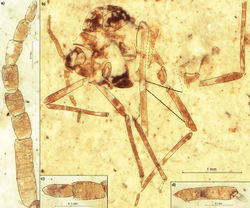Rasnitsynaphis coniuncta
| Notice: | This page is derived from the original publication listed below, whose author(s) should always be credited. Further contributors may edit and improve the content of this page and, consequently, need to be credited as well (see page history). Any assessment of factual correctness requires a careful review of the original article as well as of subsequent contributions.
If you are uncertain whether your planned contribution is correct or not, we suggest that you use the associated discussion page instead of editing the page directly. This page should be cited as follows (rationale):
Citation formats to copy and paste
BibTeX: @article{Homan2011ZooKeys130, RIS/ Endnote: TY - JOUR Wikipedia/ Citizendium: <ref name="Homan2011ZooKeys130">{{Citation See also the citation download page at the journal. |
Ordo: Hemiptera
Familia: Rasnitsynaphididae
Genus: Rasnitsynaphis
Name
Rasnitsynaphis coniuncta Homan & Wegierek, 2011 sp. n. – Wikispecies link – ZooBank link – Pensoft Profile
Material
Holotype: PIN 3064/2209; Baissa, Transbaikalia; Zaza Formation, bed 31.
Etymology
From the Latin term coniunctus for “joined” in reference to the joined rows of rhinaria.
Diagnosis
Antenna rather long; segment III four times as long as wide; segments IV–VIII of about the same length, rectangular, longer than wide.
Description
Length of the body about 2.4 (Fig. 2b). Head with epicranial suture. Antennae 0.88 long, about 2/3 of thorax height (Figs 2a, c). Length of antennal segments: II 0.12; III 0.24; IV 0.09; V 0.08; each of VI–VII 0.09; VIII 0.08; IX 0.07 to 0.08. Antennal segment III with 11 rows of rhinaria, with at most 7 rhinaria arranged in one row. Segments IV–VIII at most with 6 rows of rhinaria. Femur of fore legs 0.74 long, tibia 1.06. Middle tibia 1.14 long. Hind femur 0.87 long, tibia 1.34. The second segment of hind leg tarsus 0.24 (Fig. 2d). The distance between bases of cubital veins CuA1 & CuA2 0.13.
Original Description
- Homan, A; Wegierek, P; 2011: A new family of aphids (Hemiptera, Sternorrhyncha) from the Lower Cretaceous of Baissa, Transbaikalia ZooKeys, 130: 167-174. doi
Images
|
